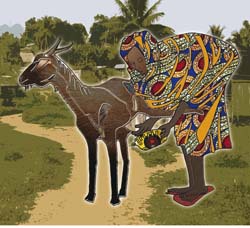Social and cultural roles
 Raising small ruminants helps women become financially independent. | In numerous societies, small ruminants fill social and cultural roles.
|
In countries in the South, small ruminant husbandry often is the work of women, who rarely hold the right to own or use land. They supervise reproduction and production. Across all cultures, women are almost always responsible for milking, making and selling dairy products, and feeding and caring for the animals. This is an activity that provides them a certain financial independence and social status, and which contributes to promoting gender equality.
Sheep and goats can be kept close to the home or allowed to wander and can be watched over easily by other members of the family such as children.





